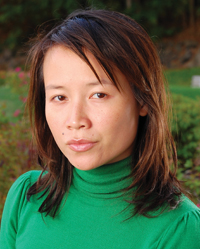
Julie Pham
By Julie Pham
New America Media
In May 2012, minority newborns began to outnumber their white counterparts in the United States. But even with an African American president and the huge growth of minority populations, why is it that we as minorities are still far from exercising the full potential of our political power as voters?
Our voter turnout numbers are relatively low because of: 1) immigrants who are eligible for naturalization but don’t become citizens; 2) citizens who don’t register to vote; and 3) registered voters who don’t vote.
According to the Immigration Policy Center, there are 8 million immigrants nationally who are eligible, but have yet to apply for naturalization. The U.S. Census shows how minorities still trail behind non-Hispanic whites in voter registration and voter turnout in Washington’s 2010 general election.

While about one-fifth of Washington’s population is comprised of minorities, only about 8 percent of those who voted were minorities. Numerous local community organizations are conducting voter registration drives to reverse this discrepancy. Let’s support their efforts.
Aside from mobilizing more voter registration and voters, we need to reframe the popular perception that minorities vote in blocks (e.g., “the Latino vote,” “the Asian vote,” “the Black vote”). Voting blocks assume we are monolithic groups that can be “won” and “owned” by a party or a candidate. In short, our vote can be taken for granted.
Both parties and all candidates need to see that our vote is something still worth earning. But we have to prove we vote.
Rather than fortifying perceptions of minorities acting in monolithic voting blocks, increasing the number of minority voters overall will increase our political power. In 2010, I formed with my colleagues in local ethnic media an association called Sea Beez, which brought about 25 media outlets together that serve very different ethnic communities. We were able to strengthen our industry by coming together, while maintaining our own diverse perspectives and opinions.
Sea Beez members keep money and politics separate. As a collective, Sea Beez does not endorse candidates nor initiatives. We organize an annual Ethnic Media Candidates Meet & Greet to foster opportunities for candidates to engage with local ethnic media and community members. This gives campaigns access to minority communities, but the only way for campaigners to capitalize on this is by seeing nuance rather than homogeny.
In this year’s election, minorities will have numerous opportunities to exert our political power. We may even help determine if a Republican will step into the governor’s office for the first time since 1980.
Although neither gubernatorial candidate’s campaign office could quantify the efforts spent on engaging ethnic communities, both cited long lists of community engagement, multi-lingual campaign material, and dedicated full-time outreach specialists.
Another sign of Washington’s growing diversity is the increasing percentage of those who speak a language other than English at home (18.6%) and who speak English “less than very well” (8%).
This poses challenges to mobilize voting in populations with limited English proficiency. Voting material in languages other than English are only available in four out of Washington’s 39 counties. In-language ethnic media serves as a major communication channel for those who speak English as a second language.
Ethnic media remains an underutilized tool to engage minorities during the election season.
According to the Public Disclosure Commission and a survey of local ethnic media, less than $30,000 was spent across 27 ethnic media outlets for campaign advertising in 2011. Of the 22 campaigns that advertised in ethnic media in 2011, only four spent more than $1,000: People for Quality Efficient & Accountable Home Care ($7,826), One America Votes ($6,895), Bruce Harrell ($5,273), and Thomas Rasmussen ($1,023). Budget dedicated to print, radio, and broadcast advertising for media in 2011 totaled over $12,400,000.
Many campaigners are currently playing it safe, investing their campaign dollars in soliciting existing likely voters, rather than taking a risk and building brand awareness among potential ones.
With the relatively low voter turnout among minorities, it’s difficult for our ethnic media to convince politicians to invest in supporting outreach to our communities.
The sheer size of our growing ethnic communities alone does not prove relevance or grant us political power. It’s our votes that matter. (end)



